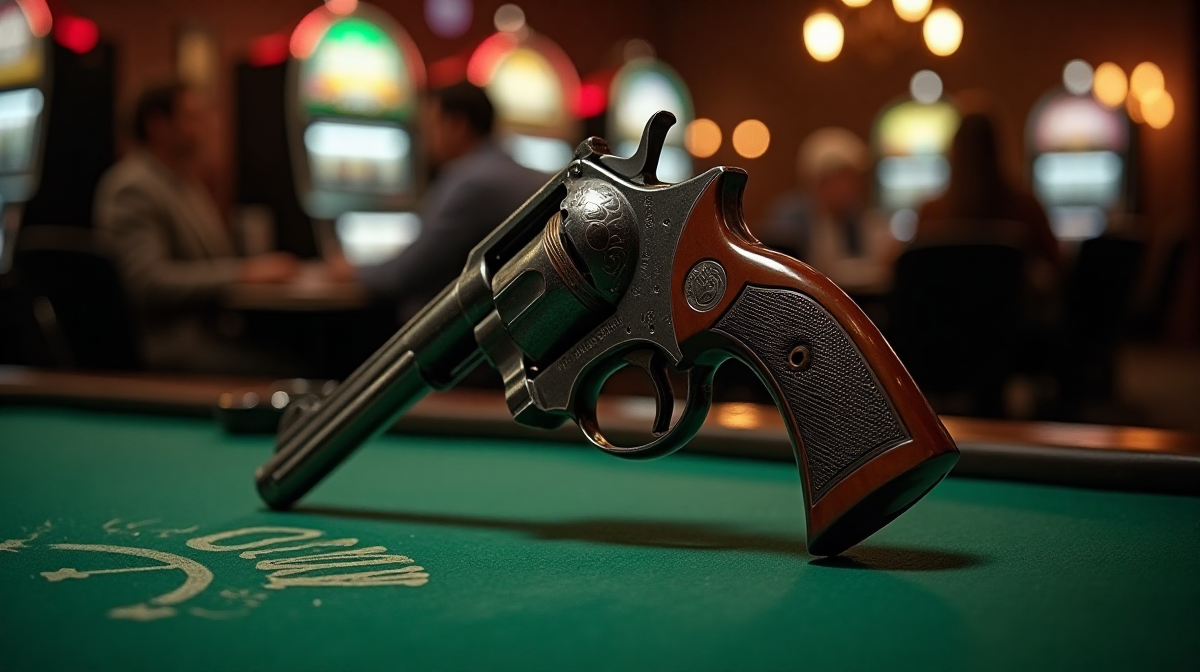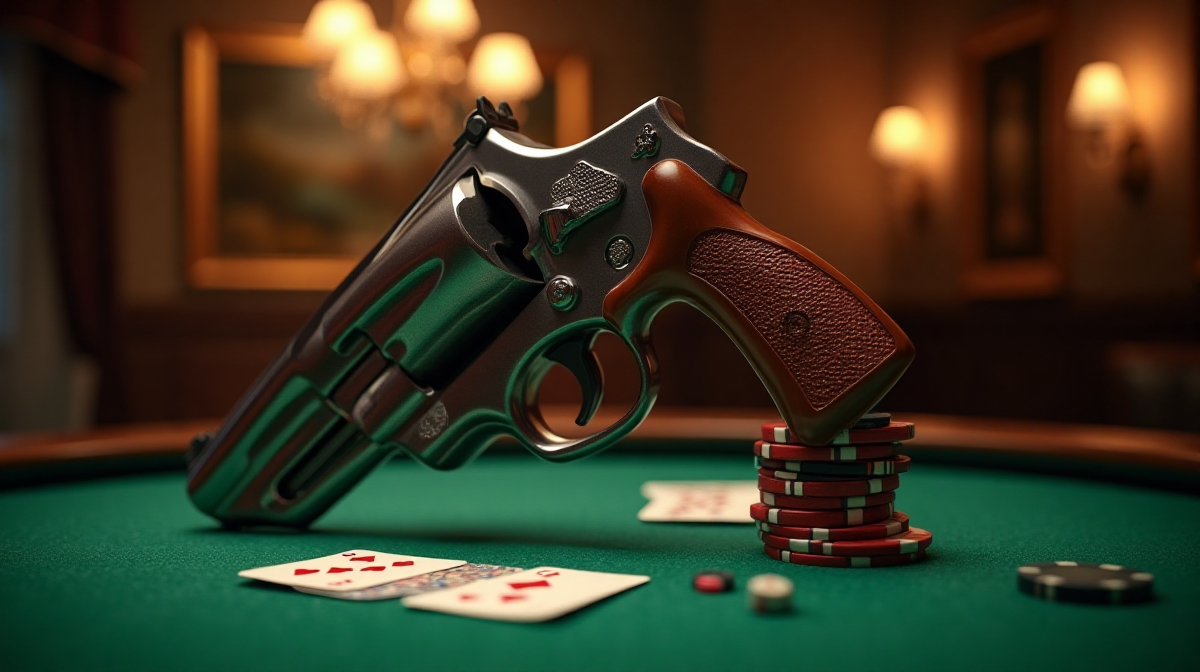Russian Roulette: Meaning & History
Introduction to Russian Roulette
Defining Russian Roulette: The Core Concept
Russian roulette is a lethal game of chance, a terrifying demonstration of risk and fate. It involves a revolver with at least one chamber empty, which is then spun, and the trigger is pulled. The outcome, life or death, rests entirely on chance. While often depicted dramatically, the core concept is brutally simple: a gamble with one’s own life. It’s a game steeped in myth and morbid fascination, and sometimes associated with online betting platforms, leading to searches for terms like “bet 365” when people seek information, though the two are unrelated.
Initial Shock Value & Modern Perception
The initial reaction to hearing about Russian roulette is almost universally one of shock and disbelief. It's difficult to comprehend why anyone would willingly participate in such a dangerous act. Modern perception is heavily influenced by its portrayal in popular culture, often associating it with desperation, nihilism, or a twisted sense of control. The very phrase evokes a chilling image, yet the historical roots are surprisingly complex. Even the process of logging into online platforms like those searching for an afc 365 bet login can be less risky than a single spin of the cylinder.
Why the Fascination? Exploring the Psychological Appeal
Despite its horrific nature, Russian roulette holds a strange and disturbing fascination for some. This appeal lies in its confrontation with mortality, its challenge to control, and its embodiment of ultimate risk. It taps into primal fears and a morbid curiosity about the limits of human experience. The illusion of control, even in a game dictated by chance, can be powerfully seductive. The allure, however dark, is a subject of ongoing psychological study.

Origins and Historical Roots
Debunking the Myth: Early Origins & Precursors
The popular narrative often presents Russian roulette as a uniquely Russian invention, but its origins are more nuanced. The practice of gambling with firearms, specifically pointing a loaded gun at oneself or others as a dare, existed long before the 20th century. These early forms weren’t the formalized “game” we recognize today, but rather reckless displays of bravado and a willingness to gamble with life, sometimes fueled by alcohol and desperation. This differs greatly from modern entertainment like finding an african 365 bet app to place a wager.
World War I: The Likely Birthplace of the Modern Game –
The most credible accounts point to World War I as the likely birthplace of the modern version of Russian roulette. During the brutal and chaotic conflict, particularly within Russian and Cossack units, soldiers facing overwhelming odds or prolonged periods of inactivity reportedly devised the game as a means of “quick death” – a way to decide who would face certain death in the next assault. It became known as the officer’s game, a grim testament to the psychological toll of war.
Specific Accounts & Anecdotes from WWI –
Documented stories from WWI, though often difficult to verify due to the nature of war and its aftermath, describe officers using the game to settle disputes or simply to stave off boredom and despair. Exaggerations and embellishments undoubtedly crept into these accounts over time, but the core narrative of desperate men gambling with their lives remains consistent. It’s important to note that these were acts born of extreme circumstances, far removed from any notion of voluntary recreation.
The Spread Beyond Russia: Early 20th Century Adoption
Following WWI, reports of Russian roulette began to surface outside of Russia, primarily among veterans and expatriates. The game spread through word of mouth and anecdotal accounts, gaining notoriety as a symbol of recklessness and despair. Its presence in early 20th-century literature and art further solidified its image in the public consciousness.
The Game’s Mechanics & Variations
Standard Rules: Chamber Size, Spin, Trigger Pull
The “standard” rules of Russian roulette are deceptively simple. A revolver, typically a six-chambered model, is loaded with one bullet. The cylinder is spun to randomize the bullet’s position, and then the trigger is pulled. If the bullet aligns with the chamber, the result is fatal. If not, the player survives, and the process may be repeated. The term russian roulette meaning is frequently searched by those curious about the origins and process.
Variations in Gameplay
Over time, variations in gameplay emerged. Some versions involved loading multiple bullets, increasing the odds of death. Others involved revising the spin/pull process, such as spinning after each pull or allowing other players to spin the cylinder. These variations only intensified the game’s inherent danger and unpredictability.
The Role of Chance & Statistics
The game is entirely reliant on chance, governed by the principles of probability. With a six-chambered revolver and one bullet, the odds of survival on the first pull are 5/6. However, each subsequent pull alters the probabilities, and the illusion of minimizing risk is just that – an illusion.
Equipment Used: Revolvers & Ammunition
Historically, various revolvers have been used in Russian roulette, with common models including the Nagant M1895 and Smith & Wesson models. The type of ammunition used also plays a role, as different cartridges have varying levels of power and impact.
Russian Roulette in Popular Culture
Literary Depictions
Russian roulette began appearing in literature in the early 20th century, initially as a symbol of post-war trauma and disillusionment. Its presence in novels and short stories gradually increased, solidifying its association with danger, despair, and the fragility of life.
Film and Television
The game’s depiction in film and television has had a profound impact on its public image. Notable examples, such as the harrowing scene in The Deer Hunter, have cemented Russian roulette as a cinematic shorthand for extreme risk and psychological torment. These portrayals, while often dramatic, have also contributed to the game’s mystique and notoriety.
Music References
Russian roulette has also found its way into music, with songs and albums referencing the game as a metaphor for reckless behavior, fate, and the perils of love. These artistic representations often explore the psychological themes associated with the game, such as fear, desperation, and the search for control.
Use as a Metaphor
Beyond its literal interpretation, Russian roulette is frequently used as a metaphor in literature, film, and everyday language. It represents recklessness, taking unnecessary risks, and confronting fate. The phrase “playing Russian roulette” is often used to describe a situation where the outcome is highly uncertain and potentially disastrous.

Psychological Impact & Motivations
The Psychology of Risk-Taking
The appeal of Russian roulette can be understood through the lens of risk-taking psychology. Some individuals are drawn to dangerous activities as a way to experience heightened arousal, test their limits, or assert control in a chaotic world. However, this attraction often masks underlying psychological vulnerabilities.
Suicidal Ideation & Russian Roulette
It’s crucial to distinguish between Russian roulette as a game and intentional self-harm. While the game can be a manifestation of suicidal ideation, it is not always the primary motivation. Some participants may be driven by a desire for attention, a need to prove their bravery, or a nihilistic worldview. It's a dangerous activity, even without explicit intent to die.
The Influence of Desperation & Trauma
Historical accounts suggest that desperation and trauma played a significant role in motivating participation in Russian roulette, particularly during wartime. Soldiers facing overwhelming odds or suffering from severe psychological distress may have seen the game as a way to escape their suffering or regain a sense of control.
Confirmation Bias & The Illusion of Control
Participants may exhibit confirmation bias, focusing on instances where they survived and attributing their success to skill or luck, rather than acknowledging the inherent randomness of the game. This reinforces the illusion of control and encourages further participation.
Real-Life Incidents & Controversies
Documented Cases & Reported Incidents
Despite its rarity, documented cases and reported incidents of Russian roulette exist. These cases often involve young men, substance abuse, and underlying mental health issues. However, verifying the accuracy of these reports can be challenging, as they often rely on eyewitness accounts or incomplete information. The search for entertainment can be far more productive – like exploring an online casino, though even that carries risk, perhaps finding a luna roulette nude search term, which is a harmful and unrelated distraction.
The Danger of Imitation & Copycat Behavior
The media portrayal of Russian roulette has raised concerns about imitation and copycat behavior, particularly among vulnerable individuals. Exposure to sensationalized accounts of the game can normalize it and encourage others to experiment with it.
Legal Implications & Criminality
Participating in Russian roulette carries significant legal implications. It can be prosecuted as assault, attempted murder, or manslaughter, depending on the specific circumstances and the intent of the participants.
Russian Roulette Today & Its Legacy
The Game’s Prevalence in the 21st Century
Russian roulette is thankfully rare in the 21st century. Its practice is widely condemned, and awareness of its dangers has increased. However, isolated incidents still occur, often among individuals struggling with mental health issues or substance abuse.
Online “Russian Roulette” & Digital Recreations
The internet has spawned digital recreations of Russian roulette, often presented as “games” or “challenges.” These online versions, while lacking the physical danger of the original, can still be psychologically harmful and contribute to the normalization of risky behavior.
The Enduring Symbolism of Russian Roulette
Despite its declining prevalence, Russian roulette remains a powerful symbol in the cultural lexicon. It represents danger, fate, recklessness, and the ultimate gamble with life.
Concluding Thoughts and Ethical Considerations
The discussion of Russian roulette requires sensitivity and ethical consideration. It’s important to avoid sensationalizing the game and to focus on the underlying psychological and social factors that contribute to its practice. Raising awareness of mental health issues and promoting responsible behavior are crucial steps in preventing future tragedies.

